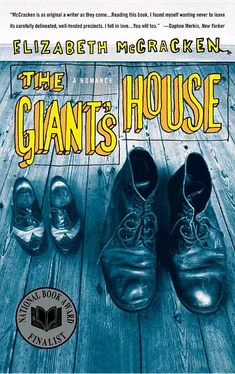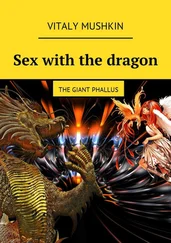They were just coming up on the library themselves. Now he was walking with difficulty, hesitant steps. Stella’s hand fluttered up to his elbow, the one that didn’t hold the cane. They parted in front of the library; James started up the stairs. At first I couldn’t tell what he was doing, exactly, and then I realized: he was walking up sideways. He set his right foot a couple of steps up, then his left foot on the step below. Then again. His feet had gotten so big he could not fit them any other way. I had no idea when this had happened: it had been ages since I’d seen him climb stairs.
I began to walk briskly, in a businesslike way, the gait of somebody who had just been to town hall, who knew nothing about teenagers and their afternoon constitutionals.
He was sitting on the wide bench inside the front room of the library.
“Peggy!” Astoria said as I stepped inside. “Look at the stranger who’s come to see us.”
“What do you know? Decided to get a little air?”
He nodded, smiling.
“What brought you here?” I said.
“Decided it was time to get out,” he said. I could not tell whether his cheeks were rosy with health or exertion. Unfair of the body, I thought, to make a man dying of a heart attack look just like a man who has finished his daily improving run.
“How was it?” I sat down next to him. I wanted to know what made Stella look so worried at the end of the walk. “Worth the trip?”
He shrugged. Then he said, “Yeah. You’re right. I shouldn’t spend all day inside. I almost forgot what this sorry old town looks like.”
Well, I thought, it worked. Still, I wanted him to mention Stella, I wanted to be able to put to use the feigned surprise I’d practiced all the way up the street.
There were two things I hadn’t expected: Stella was a good girl, and she honestly liked James. Several times a week she dropped by the cottage early in the afternoon, before the rest of the teenagers, and suggested a walk. Sometimes they dropped by the library — I imagined Stella suggested this, to show me she was serious about her assignment — sometimes they just passed the big windows by the circulation desk. Should I take her aside and explain that I’d only meant one walk, one time, not this extended engagement? No, of course not; not even I could be that dumb or mean.
She still had her boyfriend, the skinny and handsome Sean, who arrived with the other boys nearly every day. James rarely mentioned Stella, that’s how much he liked her. I don’t know whether he watched Stella and Sean leave at dinnertime, hand in hand, hating both of them, or just him, or, briefly, just her; or whether the pleasure of her solitary company a few times a week was enough for him to think that she couldn’t care for this Sean, this dull American boy of dull Irish parents.
Some afternoons I arrived at the cottage to see Stella and her Swains — what a name for a 1940s band! — arranged around the room. And like a good, shy bandleader, there was Stella in the corner, each Swain absorbed in whatever he was doing and simultaneously paying her the most rigorous, imperceptible attention. The studied negligence of the Swains! They didn’t just listen to music and dance; they played cards or did homework. One boy sat cross-legged on the floor with a book on a knee, another leaned writing against the doorjamb, stopping every now and then to shake down the ink of his ballpoint pen. “You get the answer to number eight? No? Did you, Stell?”
Normally these were kids who’d come to the library, whispering questions and answers, bottles of Coke hidden beneath jackets. Here they didn’t have to whisper, and their soda bottles stood on every surface, leaving kiss marks on the wood.
When I came in, only Stella and Sean and James would say hello. I got to know the other boys slowly: chubby Benny, whose eyes were so sunken they looked like bruised thumbprints in his face. Sullen Frank, who stuttered darkly. Eric, a good friend of James’s, a small kid with a brush cut who I knew from his visits to the library to take out books on sports. When Eric walked, he did not move the upper half of his body at all — passing by the circulation desk, he looked as if he were on wheels. He also could not speak in words, but offered nervous polite sounds — not the rude grunting noise other nontalking boys used, just pure open vowels.
“Hello, Eric,” I said.
“Ah,” said Eric.
“How’s school?”
“Oh,” Eric said, halfway between good and I don’t know yet .
And from across the room, Stella would call out, “Hi, Miss Cort!” I’d give her a jaunty, uncaring wave. She could break Frank’s heart, and Benny’s and Eric’s, but mine was safe.
Or mostly; sometimes even I was charmed. She was the object of so many glances, stares, careful appraisals, compliments, that when she looked at you it was as if she reflected all that dazzling attention upon you. She did it without talking: she looked at you directly, a small touch of cynicism to her smile. It was the cynicism, strangely, that made it appear she was paying attention; it made you feel like her co-conspirator.
James started asking me about my car.
“I can fit, right?” he said.
“Yes. Sure.”
“You wouldn’t mind giving me a ride somewhere?”
“Say the word. Where do you want to go?”
“I dunno.”
“We could take it to the shoe store, you know.”
He made a face. “I was thinking somewhere closer. The beach, maybe.”
“Okay.”
“And maybe I could bring a friend.”
“Oh,” I said. “Sure.”
“Another person could fit, right? In the backseat? A small person?”
I smiled. “Yes,” I said. “A small person could. Eric?”
“No. Stella maybe.”
“Stella would fit,” I said, as if I’d just measured the backseat for Stella’s measurements.
“So. You wouldn’t mind? Like maybe Sunday, when you weren’t working.”
“James,” said I, the chaperone, unwitting and unwilling cupid, “of course not.”
So I did a little research, asked about beaches. I even bought the fixings for a picnic lunch. James himself could not have been as nervous as I was; the whole week felt like one terrible endless day without break, with Sunday, twilight, promised at the end, Stella ascendant.
Except they took a walk together that Friday, the last Friday of the school year, and Stella told James — who, she said, was her best friend in the world — this: that Sean had proposed, and she had accepted, and that in two months they would move together to Virginia, where Sean would work for his uncle and Stella would, despite everything, finish high school. In Virginia, in some small town, she would be the prettiest housewife in the twelfth grade, and Sean the only husband at the senior prom.
I was afraid that he’d stop walking, now that Stella was planning for her wedding. But he didn’t; he walked by himself. I got used to seeing him at a distance. No, that wasn’t true — I was used to that already. Was it because of his size that I was so unused to putting myself in the frame? Did I think I wouldn’t fit?
No. That was how I always saw myself, that is, how I didn’t see myself. I have felt out-of-frame all my life. At best, even as I say this, I am the court painter who, after years of painting the royal family, can no longer resist slipping a bit of herself in the frame. Look, there’s Peggy, her forearm, the toe of her shoe, her frozen unrecognizable face in a swollen mirror on the farthest wall of the room. It doesn’t matter who I am looking at: they are royalty, compared to me.
James was the only one who ever drew me in at all. In the evenings when we talked, after the teenagers had gone off and there was room, he was the one who made me feel looked at instead of just looking.
Читать дальше












